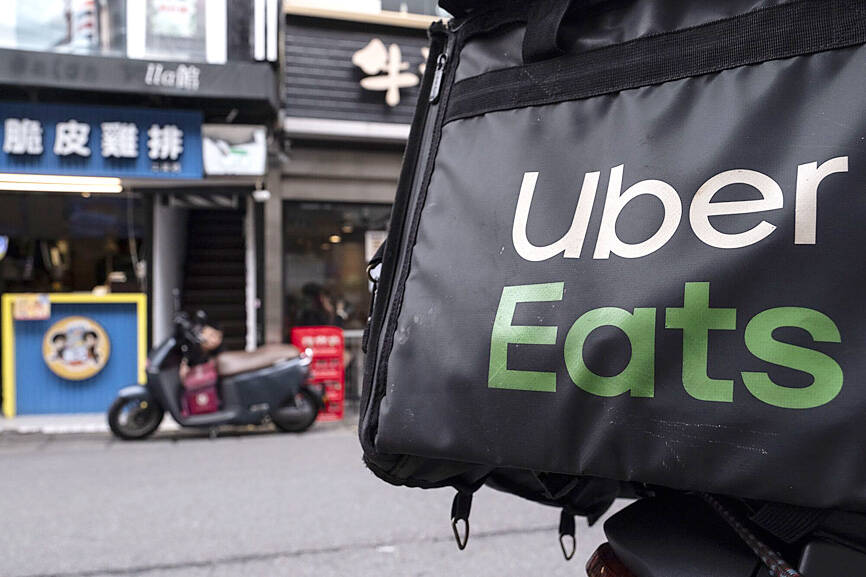Uber Technologies Inc has terminated its deal to acquire Delivery Hero SE’s Foodpanda business in Taiwan, after the local antitrust regulator rejected it in December last year.
Uber is required to pay a termination fee that is estimated to be about US$250 million, Delivery Hero said in a statement on Tuesday.
In a separate statement to Bloomberg News, an Uber spokesman reiterated the company’s disappointment about the Taiwanese regulator’s ruling, but said it respects the decision and would not be pursuing an appeal.

Photo: Lam Yik Fei, Bloomberg
“We remain committed to Taiwan and will continue to serve consumers, merchants and delivery partners there in innovative and competitive ways,” the spokesman said.
Uber announced on May 14 last year that it had reached an agreement to acquire Foodpanda delivery service in Taiwan for US$950 million. The company had aimed to complete the all-cash deal by the first half of this year, but the deal was ultimately rejected by the Fair Trade Commission on Dec. 25 last year on the grounds that it would restrict competition.
The acquisition would have been one of Taiwan’s largest outside of the chip industry and given Uber Eats a market share of more than 90 percent in the country, marking a retreat for Delivery Hero from Asia.
Delivery Hero said in the statement that Taiwan remains a key part of its long-term strategy.
The online delivery industry has seen further consolidation globally as demand has failed to return to COVID-19 pandemic-era growth.
London-based Deliveroo PLC on Monday announced that it was closing its Hong Kong business after weak sales and mounting competition from Foodpanda and Keeta, a subsidiary of Chinese food delivery giant Meituan (美團).

ACTION PLAN: Taiwan would expand procurement from the US and encourage more companies to invest in the US to deepen bilateral cooperation, Lai said The government would not impose reciprocal tariffs in retaliation against US levies, President William Lai (賴清德) said yesterday, as he announced five strategies to address the issue, including pledging to increase Taiwanese companies’ investments in the US. Lai has in the past few days met with administrative and national security officials, as well as representatives from various industries, to explore countermeasures after US President Donald Trump on Wednesday last week announced a 32 percent duty on Taiwanese imports. In a video released yesterday evening, Lai said that Taiwan would not retaliate against the US with higher tariffs and Taiwanese companies’ commitments to

Intelligence agents have recorded 510,000 instances of “controversial information” being spread online by the Chinese Communist Party (CCP) so far this year, the National Security Bureau (NSB) said in a report yesterday, as it warned of artificial intelligence (AI) being employed to generate destabilizing misinformation. The bureau submitted a written report to the Legislative Yuan in preparation for National Security Bureau Director-General Tsai Ming-yen’s (蔡明彥) appearance before the Foreign Affairs and National Defense Committee today. The CCP has been using cognitive warfare to divide Taiwanese society by commenting on controversial issues such as Taiwan Semiconductor Manufacturing Co’s (TSMC, 台積電) investments in the

HELPING HAND: The steering committee of the National Stabilization Fund is expected to hold a meeting to discuss how and when to utilize the fund to help buffer the sell-off The TAIEX plunged 2,065.87 points, or 9.7 percent, to close at 19,232.35 yesterday, the highest single-day percentage loss on record, as investors braced for US President Donald Trump’s tariffs after an extended holiday weekend. Amid the pessimistic atmosphere, 945 listed companies led by large-cap stocks — including Taiwan Semiconductor Manufacturing Co (TSMC, 台積電), Hon Hai Precision Industry Co (鴻海精密) and Largan Precision Co (大立光) — fell by the daily maximum of 10 percent at the close, Taiwan Stock Exchange data showed. The number of listed companies ending limit-down set a new record, the exchange said. The TAIEX plunged by daily maxiumu in just

‘COMPREHENSIVE PLAN’: Lin Chia-lung said that the government was ready to talk about a variety of issues, including investment in and purchases from the US The National Stabilization Fund (NSF) yesterday announced that it would step in to staunch stock market losses for the ninth time in the nation’s history. An NSF board meeting, originally scheduled for Monday next week, was moved to yesterday after stocks plummeted in the wake of US President Donald Trump’s announcement of 32 percent tariffs on Taiwan on Wednesday last week. Board members voted to support the stock market with the NT$500 billion (US$15.15 billion) fund, with injections of funds to begin as soon as today. The NSF in 2000 injected NT$120 billion to stabilize stocks, the most ever. The lowest amount it